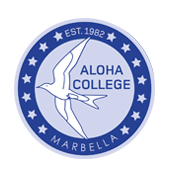Aloha College Marbella, first ECO School on the Costa del Sol.
At the beginning of the 2018-2019 academic year, Aloha College Marbella became the first ecological school on the coast. This is yet another example of the school’s strong commitment to human values and social responsibility.

And what is an Eco School? Some may wonder… An eco school is an educational centre that has integrated sustainability into its teaching and management model. It seeks to conserve the environment through its educational community.
That is exactly what Aloha College Marbella has done. We aspire to our first ‘Eco-Schools Green Flag’, which is an internationally recognised award for excellence in environmental action and learning. You can work up to Green Flag level by achieving Bronze and Silver awards which are self-accredited stepping stones along the way.
What actions is Aloha College Marbella taking to be considered an Eco School?
We are carrying out a lot of different activities including “the 7 steps to becoming an Eco School”:
- Form an Ecological Committee led by students. The Eco Committee ensures that the entire school knows about their activities and meets regularly to discuss environmental actions.
- Carry out an Environmental Review to help the school’s community identify its current environmental impact.
- An Action Plan is key for an Eco School work and should be developed with the results of an Environmental Review. It has to be SMART (specific, measurable, attainable, realistic and timely) and pupils have to be involved as much as possible in the drawing of the action plan.
- Monitor and Evaluate: to find out whether or not a school is successfully achieving the targets set out in the action plan, progress must be monitored and measured. Results of monitoring should be regularly updated and displayed for the whole school to see, and pupils should be given the responsibility for carrying out the monitoring activities.
- Curriculum work: Besides increasing the status of the programme, linking eco schools activities to the IPC and cross-curricular lessons ensures that an eco schools is truly integrated within the school community.

- Getting everyone on board! Actions should not just be confined to the school and pupils should take home ideas to put into practice. It is essential that the whole school is involved in, and the wider community aware of, the school’s Eco-Schools programme.
- Produce an Eco Code, a statement that represents the school’s commitment to the environment.
It is crucial that pupils play a key role in the development of the Eco Code, as this will give them a greater sense of responsibility towards the values the Eco Code represents.

And finally the Green Flag!
Usually, after 3 years of implementing the programme and reaching a high level of performance in complying with these 7 steps, schools can then apply for and be awarded the Green Flag… and that’s our focus!












